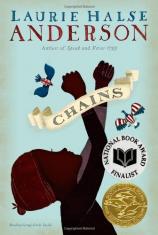Reading Group Guide
Discussion Questions
Chains

- Describe the life of slaves in the American colonies in the 1700s. Discuss the difference between a servant and a slave. How did Miss Mary Finch's view of slavery differ from that of most slave owners? Why does Mr. Robert accuse Isabel of lying when she tells him that she read Miss Mary's will? Explain why Pastor Weeks thinks that teaching a slave to read only "leads to trouble."
- Mr. Robert collects Isabel and Ruth on the day of Miss Mary's funeral. Why aren't the girls allowed to take personal items with them? Explain the symbolism of the seeds that Isabel hides in her pocket. She plants the seeds, and one day finds that the plants have died. What do the dead plants represent? There is another plant metaphor in the novel. Explain what the mayor of New York means when he compares the rebels to vines.
- Role models may be found in real life and in stories. How are Isabel's momma and Queen Esther, from the Bible, her role models for bravery? Discuss the connection between bravery, courage, and fear. What is Isabel's first act of bravery? Discuss her most fearful moments. How is her bravery and courage fueled by her fears? How does she become bolder and braver as the novel develops?
- The American Revolution was about freedom and liberty. Mr. Lockton, a Loyalist, thinks that freedom and liberty has many meanings. Define freedom from his point of view. How might the Patriots define freedom and liberty? Isabel has lived her entire life in bondage, but dreams of freedom. What does freedom look like in Isabel's mind?
- Discuss why Curzon thinks that Isabel will be a good spy. At what point does she accept his offer? Isabel feels betrayed by Curzon. How is Curzon betrayed by Colonel Regan? At what point does Isabel understand that Curzon's dream of freedom is the same as hers? How does this realization help her forgive him? At the beginning of the novel, Isabel needs Curzon. How does he need her at the end of the novel?
- Isabel encounters a woman in the street singing "Yankee Doodle," and realizes that the woman is a messenger. What is the message? Colonel Regan gives Isabel the code word ad astra to use when entering the rebel camp. The word means "to the stars" in Latin. Why is this an appropriate code word for the rebels? How does this word foreshadow Isabel and Curzon's ultimate escape to freedom at the end of the novel?
- The mayor of New York, a Loyalist, says, "The beast has grown too large. If it breaks free of its chains, we are all in danger. We need to cut off its head." Who is the beast? Who is the head? Why is Lockton so adamantly opposed to the mayor's proposal?
- Isabel says, "Madam looked down without seeing me; she looked at me face, my kerchief, my shirt neatly tucked into my skirt, looked at my shoes pinching my feet, looked at my hands that were stronger than hers. She did not look into my eyes, did not see the lion inside. She did not see the me of me, the Isabel." What is the lion inside of Isabel? What does Lady Seymour see in Isabel that Madam Lockton doesn't see? How does the "lamb" in Lady Seymour help the "lion" inside of Isabel escape?
- Explain the following metaphor: "Melancholy held me hostage, and the bees built a hive of sadness in my soul." What precipitates such sadness in Isabel? How does the hive grow bigger before Isabel learns to destroy it?
- The old man that Isabel calls Grandfather says, "Everything that stands between you and freedom is the river Jordan." He assures her that she will find it if she looks hard enough. What is the figurative river Jordan in the novel? Discuss all of the tributaries that feed into Isabel's river Jordan.
- The bookseller gives Isabel a copy of Common Sense by Thomas Paine. He advises her that the words are dangerous, and that she should commit them to memory. At what point does she understand Paine's words? How does the book give her courage?
- What does Isabel mean when she says, "I was chained between two nations"? There are several references to chains throughout the novel. How is the word "chain" used as an antonym to the word "freedom"?
Chains
- Publication Date: January 5, 2010
- Genres: Historical Fiction, Young Adult 12+
- Paperback: 336 pages
- Publisher: Atheneum
- ISBN-10: 1416905863
- ISBN-13: 9781416905868








